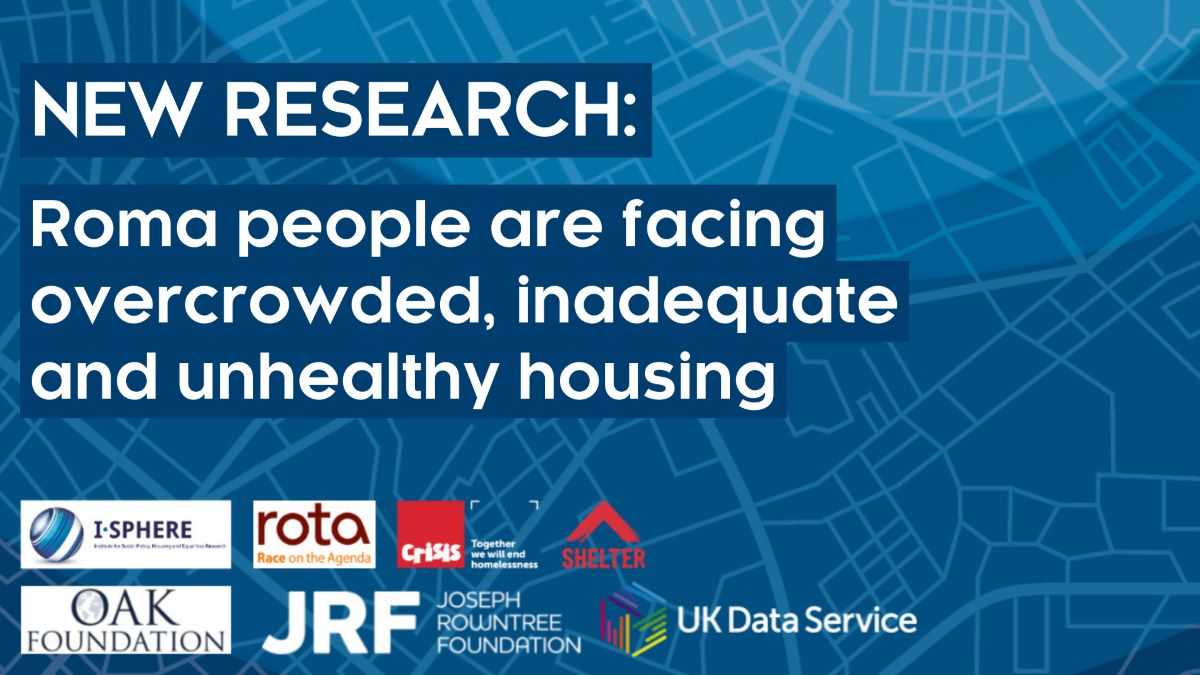Published:

New research published by Heriot-Watt University has found that Romanian Roma people are disproportionately affected by ‘hidden homelessness' and are more at risk than white people of living in overcrowded and severely substandard housing.
The study focused on exploratory case studies and key informant interviews in Luton and Glasgow. Funded by Oak Foundation, it is the second output from the Homelessness and Black and Minoritised Ethnic Communities in the UK: knowledge and capacity building programme.
The report's findings challenge the stereotypical image of Roma people living as large extended households by choice, finding instead they are constrained by circumstances. Roma interviewees viewed living with numerous households under one roof as a temporary solution. It also found that living in overcrowding conditions led to significant levels of stress and anxiety about disturbing the lead tenants. This was seen as particularly problematic for younger household members who rarely had their own room or private space and could impair the educational and personal development of children and teenagers.
Roma communities are commonly marginalised and face a level of prejudice and a lack of understanding which is arguably beyond that faced by many other minoritised ethnic groups.
In order to avoid living in severely overcrowded accommodation, several participants in both case study areas had moved out of accommodation shared with family and rented their own house, but these properties were often of an extremely poor standard. There were also cases of households facing health and physical injury due to high levels of overcrowding and poor housing conditions.
Many of those interviewed did, however, have a positive view on their life in the UK, noting how much worse their circumstances had been while living in Romania. This meant their expectations were very low because of the challenging experiences they were leaving behind.
Lead author Dr Ionut Cioarta, a research intern with Heriot-Watt University, is Roma and lives in Glasgow. He explained: “Although quite visible in the mainstream, Roma is often a hidden ethnic minority group which is commonly overlooked or combined with other minoritised ethnic groups when considered in wider policy and public services discussions. Roma communities are commonly marginalised and face a level of prejudice and a lack of understanding which is arguably beyond that faced by many other minoritised ethnic groups. While the issue of homelessness among Roma people is highly complex, it is woefully under-researched. This leaves policymakers and service providers with extremely limited information to inform their current and future interventions. We found there is a poor level of understanding about the unique challenges and factors that might increase the risks of homelessness among Roma people.
“While this report has gone some way to reveal the current challenges, a lot more work is now needed to better tailor interventions to the specific cultural needs of Roma people. Our qualitative investigation indicates that ‘hidden' forms of homelessness is an immediate and significant concern amongst the Romanian Roma community, and further quantitative and qualitative research is now urgently needed across the remainder of the UK to identify the overall scale, patterns and trends with respect to this finding.”
Matt Downie, Chief Executive of Crisis, said: “This report makes for harrowing reading, but unfortunately its findings are not surprising. Every day we see in our services that minoritised ethnic communities are experiencing higher rates of homelessness. It's horrifying that so many Roma people are having to endure appalling and overcrowded living conditions when trying to access a safe and secure home. National and local government must sit up and take notice of this report. We need long term, culturally sensitive solutions to end homelessness for good and the recommendations set out today should be implemented now to ensure everyone has access to suitable, safe and appropriate accommodation, regardless of their background, nationality or personal circumstances.”
A spokesperson for the Rom Romeha Advice Team, Community Renewal Trust in Glasgow said: “In the last year we have seen an increase in Roma people in Glasgow facing homelessness. Being homeless generates a response from the City Council, usually temporary accommodation, but for many families this moves them further away from the crucial advice and support networks they need. It is a growing problem that needs an inclusive solution. We hope this report draws attention to the extent of the problem and creates leverage for more durable solutions for the Roma families affected. For now, it is a lose lose situation for all, massive costs for the city council and unpopular and exclusionary housing solutions for the families involved. There must be a better way - let's work together to find it.”
The report makes a number of practical recommendations including the need for better dialogue and understanding between the Roma community and mainstream public services that could assist them to navigate their housing and other challenges.
Read the report in full: Exploring the phenomenon of Roma homelessness in the UK.